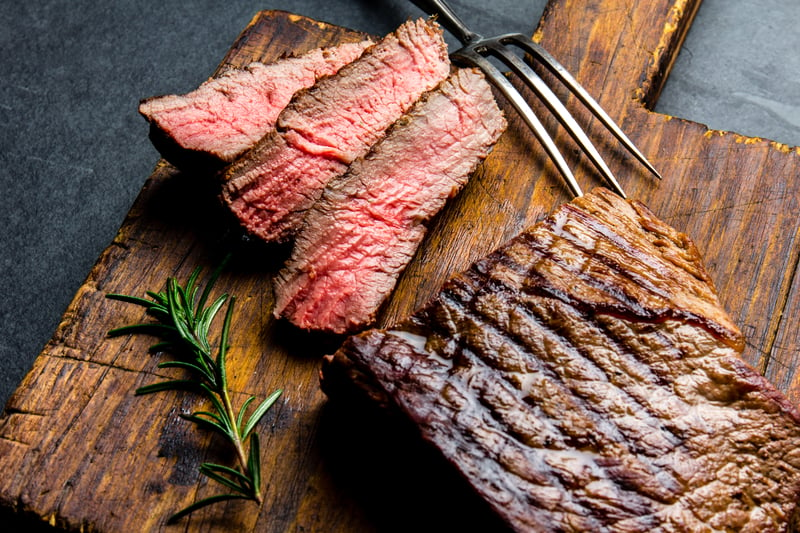What Exactly Are the Meat Sweats (and are they real)?

Whether you’re talking about the 2001 Friends Thanksgiving episode, comments after a hot dog eating contest, or the latest round of meat-related memes, you may have wondered if meat sweats are real or just uttered as a joke after eating a big old pile o’ meat. That is, unless you have actually experienced the phenomenon.
So, what exactly are the meat sweats, are they real, and what can you do about them?
The Truth About Meat Sweats—According to Science
If you’ve ever had a really big steak, a large plate of brisket, or participated in a hot dog-eating competition, you likely already know meat sweats are, in fact, real. Even if you’ve only witnessed someone consuming a large plate of meat, you may have noticed sweat streaming down their face or chest.
Sweating after eating a super high-protein—especially animal protein—meal does indeed happen. And, it’s explained by science.
You see, meat sweats are caused by the thermic effect of food. After eating any food, the entire body works hard to digest the food. The brain, mouth, salivary glands, esophagus, digestive tract, pancreas, gall bladder, and liver are all activated to digest and absorb the nutrients you just consumed.
What you eat can determine how hard your body will have to work—and how much energy it will take—to break down those calories in a process known as diet-induced thermogenesis. This process naturally increases body temperature. The more energy expended, the hotter you’ll feel. In response, the body may then begin to sweat to help cool the body: i.e., meat sweats.
When you eat fat and carbs, it takes less energy (5 to 10% of the calories ingested) to break them down than when you eat protein (20 to 30% of calories ingested) or consume alcohol due to the needed metabolic pathways. In other words, your body has to work harder to break down that plate of brisket than it does to break down a bowl of broccoli and rice.
How long it takes for you to metabolize food can also affect when you experience the meat sweats. Some people are drenched in sweat as they eat. Others don’t feel the effects until hours later—even late into the night.
What Meat Sweats Are Not
There are a lot of theories about what causes meat sweats. There’s no evidence that meat sweats are caused by:
- Medical conditions
- Allergic reactions to food, which instead result in hives, rashes, digestive problems, itching, runny nose, or potentially life-threatening anaphylaxis
- Food intolerances, which are typically discovered by digestive complaints like diarrhea, gas, and nausea.
Can You Prevent Meat Sweats?
Yes, you can. The easiest way to prevent the meat sweats is to watch your portion sizes. Eat no more than eight ounces of meat per day. That includes not just steak and hot dogs but any high-protein foods like chicken, turkey, fish, and protein-rich dairy (e.g., certain cheeses).
To prevent meat sweats, it can also help to:
- Limit protein portion sizes to about the size of your palm or around three to four ounces per meal.
- Balance out your meals with vegetables, whole grains, and healthy fats. The fiber from the vegetables and whole grains can help slow digestion and also help you eat less meat.
- Space out servings, waiting a few hours between plates of food rather than sitting down for a big feast all at once.
- Save the booze for later and consume larger meals with just water. Protein and alcohol consumed together increase the thermic effect even further.
- Exercise regularly to support a healthy metabolism.
- If you’re overweight, drop body fat as excess weight can increase basal body temperature, which can make meat sweats more likely.
- Eat less meat in general, which may also help improve body odor.
What if you already ate too much meat and you’re afraid you’ll start sweating? Help your body regulate your temperature by sipping some water. It can also help to wear more breathable clothing and relax in a cooler location as your body digests the food.
Meat Sweats Wrap-Up
While meat sweats usually aren’t anything to worry about, they can be uncomfortable to experience and even witness. Taking simple steps to prevent them may just help you feel better during and after meals.



 7 Signs Your Body is Seriously Low on Collagen (not just wrinkles)
7 Signs Your Body is Seriously Low on Collagen (not just wrinkles) Health Expert: "Turmeric Doesn't Work (unless...)"
Health Expert: "Turmeric Doesn't Work (unless...)" 3 Warning Signs Your Probiotic Supplement is a Total Waste
3 Warning Signs Your Probiotic Supplement is a Total Waste

